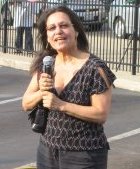Helen Shiller | |
|---|---|
 | |
| Member of the Chicago City Council from the 46th ward | |
| In office 1987–2011 | |
| Preceded by | Jerome Orbach |
| Succeeded by | James Cappleman |
| Personal details | |
| Born | 1947 New York |
| Political party | Democratic |
| Children | 1 |
| Residence(s) | Chicago, Illinois, United States |
| Alma mater | University of Wisconsin–Madison |
| Website | Citizens for Shiller |
Helen Shiller (born 1947) is a former Alderman of the 46th ward in Chicago, Illinois. Shiller is also a published author, having written a 500-page book on her politics and activism in Chicago from 1971 to 2011.[1] Shiller served in the Chicago City Council for six four-year terms, from 1987 to 2011. Shiller was elected to the City Council on her third attempt, as Harold Washington, Chicago's first black Mayor, was re-elected to his second term, and her election as alderman helped close the Council Wars era in Chicago government. Shiller has been described as "a reformer unafraid to take on the boys in power."[2] A less flattering description is that she is "committed to liberal causes and destroying all within her path".[3] Among her most significant impacts on Chicago were her advocacy for diverse, inclusive, affordable housing and helping craft Chicago's response to the HIV/AIDS crisis. Her commitment to fostering community development without displacement often brought Shiller into contention with some constituencies, real estate developers, and editorial boards. Shiller's oral history was collected by Pulitzer Prize-winning author and Uptown resident Studs Terkel in his 2003 book, Hope Dies Last. As she details in her own book, among her policy victories as a City Council member was: getting human rights legislation passed,[1] having Chicago implement anti-apartheid legislation,[1] creating a City Council Subcommittee on Domestic Violence,[1] and building a unique mix-used development.[1]
- ^ a b c d e SHILLER, HELEN (2022). DARING TO STRUGGLE, DARING TO WIN. [S.l.]: HAYMARKET BOOKS. ISBN 978-1-64259-842-1. OCLC 1315537007.
- ^ "Two Strikes, You're Out: A Review of Helen Shiller's Daring to Struggle, Daring to Win | Newcity Lit". 2022-10-31. Retrieved 2022-11-08.
- ^ Cite error: The named reference
Joravskywas invoked but never defined (see the help page).